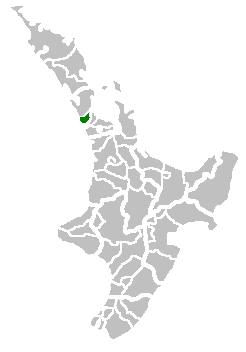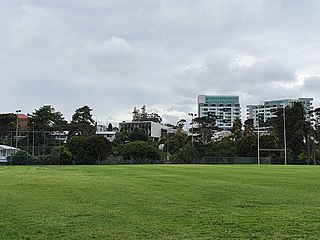
Waitākere City was a territorial authority in West Auckland, New Zealand; it was governed by the Waitākere City Council from 1989 to 2010. It was New Zealand's fifth-largest city, with an annual growth of about 2%. In 2010 the council was amalgamated with the other authorities of the Auckland Region to form the current Auckland Council.

Titirangi is a suburb of West Auckland in the Waitākere Ranges local board area of the city of Auckland in northern New Zealand. It is an affluent, residential suburb located 13 kilometres to the southwest of the Auckland city centre, at the southern end of the Waitākere Ranges. In the Māori language "Titirangi" means "hill reaching up to the sky".

The Whau River is an estuarial arm of the southwestern Waitemata Harbour within the Auckland metropolitan area in New Zealand. It flows north for 5.7 kilometres (3.5 mi) from its origin at the confluence of the Avondale Stream and Whau Stream to its mouth between the Te Atatū Peninsula and the long, thin Rosebank Peninsula in Avondale. It is 800 metres (2,600 ft) at its widest and 400 metres (1,300 ft) wide at its mouth.

Glen Eden railway station is located on the Western Line of the AT Metro rail network in Auckland, New Zealand. The station house is a local historical landmark that was restored in 2001. A cafe is located in the old station building.

Konini is a suburb in the West Auckland, New Zealand, under the local governance of Auckland Council. Kōnini is the Māori language name for the fruit of the tree fuchsia.

Glen Eden is a suburb of West Auckland, New Zealand, located at the foothills of Waitākere Ranges. Originally known as Waikumete, the suburb gained the name Glen Eden in 1921. The suburb is in the Waitākere Ward, one of the thirteen administrative areas of Auckland governed by Auckland Council.

Waiatarua is a small settlement near the top of the Waitākere Ranges in West Auckland, close to the junction of Scenic Drive, West Coast Road and Piha Road to Piha and runs east until the junction of Scenic Drive and Mountain Road. Surrounded by native bush in the Centennial Memorial Park and the water catchment area, Waiatarua is over 300 metres above sea level and some houses are over 400 metres above sea level. Waiatarua means “song of two waters”, possibly referring to the ability to see both the wild west coast, and the still, sparkling waters of the Manukau and Waitemata harbours from certain points in the area.
Waitemata City was a New Zealand city in the greater Auckland area. It was formed in 1974 from the western part of the old Waitemata County, with both the County and City taking their names from Waitemata Harbour. In 1989, when New Zealand local government bodies underwent a major re-organisation, Waitemata City joined with its southern neighbours, the boroughs of Henderson, Glen Eden, and New Lynn, to form the modern city of Waitakere.

Glen Eden Intermediate School (G.E.I.S) is a state Co-Educational Intermediate school located in the suburb of Kaurilands in Auckland, New Zealand. The roll fluctuates around 1050 student and there is an enrolment scheme in place. In-zone suburbs include Titirangi, Laingholm, most of Glen Eden and nearby Konini and Kaurilands. Maree Stavert has been principal since the retirement of Terry Hewetson in 2015.

The Western Line in Auckland, New Zealand is the name given to suburban rail services that operate between Britomart and Swanson via Newmarket.

Auckland Libraries is the public library system for the Auckland Region of New Zealand. It was created when the seven separate councils in the Auckland region merged in 2010. It is currently the largest public-library network in the Southern Hemisphere with 55 branches from Wellsford to Waiuku. Currently from March 2021, the region has a total of 56 branches.

Lopdell House is situated next to Te Uru Waitakere Contemporary Gallery as part of the Lopdell Precinct arts centre in Titirangi, Auckland. It was first opened as Hotel Titirangi in 1930. In 1942 it was bought by the Ministry of Education and became a school for the deaf, and then a teacher's residential centre named Lopdell House. The Waitemata City Council purchased it in 1983 and leased it to the Lopdell House Society, who reopened in 1986 as an arts centre. Adjacent to the house is a statue of Titirangi founder, Henry Atkinson.

Waitākere Ranges Local Board is one of the 21 local boards of the Auckland Council, and is one of the two boards overseen by the council's Waitākere Ward councillors.

Kaurilands is a suburb of West Auckland, which is under the local governance of Auckland Council. The area was subdivided and developed in the 1920s.

The PumpHouse Theatre is an artist-led arts centre that presents theatre and other events in the North Shore of Auckland, New Zealand.

Waitākere Ranges is a local government area in Auckland, in New Zealand's Auckland Region, governed by the Waitākere Ranges Local Board and Auckland Council. It currently aligns with the council's Waitākere Ward.

West Auckland is one of the major geographical areas of Auckland, the largest city in New Zealand. Much of the area is dominated by the Waitākere Ranges, the eastern slopes of the Miocene era Waitākere volcano which was upraised from the ocean floor, and now one of the largest regional parks in New Zealand. The metropolitan area of West Auckland developed between the Waitākere Ranges to the west and the upper reaches of the Waitematā Harbour to the east. It covers areas such as Glen Eden, Henderson, Massey and New Lynn.

Parrs Park is a public recreational and sporting facility in Oratia, West Auckland, New Zealand. The park has lease arrangements with clubs and cultural organisations that have buildings and facilities on the perimeter and share the amenities of the park. The local community has a strong relationship with the park, organising and participating in events on the grounds, providing feedback to the council and voicing concerns. Parrs Park has been managed under a number of different Council structures since 1966 and as of 2022, is jointly governed by elected members of the Waitākere Ranges Local Board, as part of Auckland Council.
The Trusts are a group of two community-owned organisations with a near monopoly on the sale of alcohol in West Auckland. They are one of the largest alcohol retailers in New Zealand.

The Little Muddy Creek is a river of the Auckland Region of New Zealand's North Island. It flows south from its source in Titirangi, meets the tributaries Waituna Stream and Waiohua Creek which run through the suburbs of Waima and Woodlands Park, before reaching the Manukau Harbour.


















